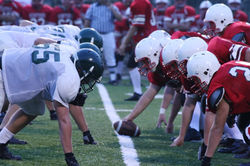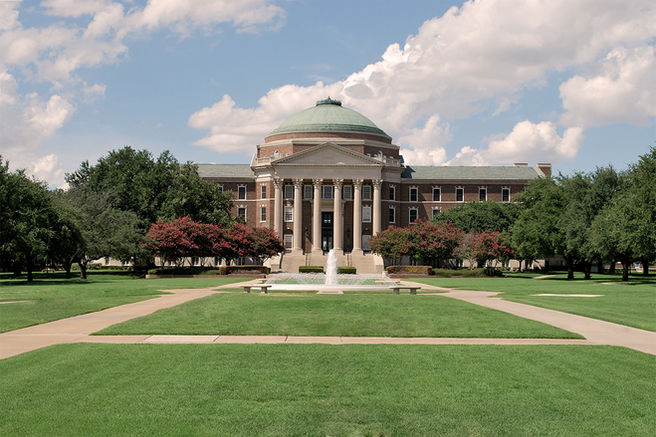SIMON FRASER UNIVERSITY
McMaster University is located in Hamilton, and comprises 57 buildings, 122 programs, and over 21 500 students [1]. It was first established in the year 1887 and is split into six different academic facilities: Degroote School of Business, Engineering, Health Sciences, Humanities, Social Sciences, and Science [2] . They’re known as the McMaster Marauders with their mascot named “Mac the Marauder.” The institution is home to over 300 student organizations and clubs, however, they do not recognize any fraternities or sororities [2]. Their main academic policy is known as the “McMaster Model,” which focuses on a student-centred, problem-based, interdisciplinary approach to learning which has been used since the 1960s [2]. Only 3700 students live in twelve on-campus residences with a range of building sizes and dormitory styles [1]. Finally, McMaster University is a member of a group of research intensive Canadian universities known as the U15 [2].
 |  |
|---|---|
 |  |
 |  |
 |  |
 |  |
 |  Public Speaker |
 Bald Eagle |
|---|
SIMON FRASER UNIVERSITY
 |  |
|---|---|
 |  |
 |  |
 |  |
 |  |
 |  Public Speaker |
McMaster University is located in Hamilton, and comprises 57 buildings, 122 programs, and over 21 500 students [1]. It was first established in the year 1887 and is split into six different academic facilities: Degroote School of Business, Engineering, Health Sciences, Humanities, Social Sciences, and Science [2] . They’re known as the McMaster Marauders with their mascot named “Mac the Marauder.” The institution is home to over 300 student organizations and clubs, however, they do not recognize any fraternities or sororities [2]. Their main academic policy is known as the “McMaster Model,” which focuses on a student-centred, problem-based, interdisciplinary approach to learning which has been used since the 1960s [2]. Only 3700 students live in twelve on-campus residences with a range of building sizes and dormitory styles [1]. Finally, McMaster University is a member of a group of research intensive Canadian universities known as the U15 [2].
 Bald Eagle |
|---|
Check out McMaster's official socials...
RA
NK
IN
GS
#
72
72
IN THE WORLD
#
4
4
IN CANADA
 |  |
|---|---|
 |  |
 |  |
 |
According to the 2020 Times Higher Education World University Rankings
Check out McMaster's official socials...
 |  |
|---|---|
 |  |
 |  |
 |
RA
NK
IN
GS
#
72
72
IN THE WORLD
#
4
4
IN CANADA
According to the 2020 Times Higher Education World University Rankings
Dalhousie University
Dalhousie University is located in the rainy, maritime province of Nova Scotia, and is one of the oldest institutions of higher education in all of Canada (est. 1818) [1]. With a whopping five campuses (Halifax (main), Studley, Sexton, Carleton, Agricultural), and 110 programs, it’s weird to see the relatively low student count of only 18,000~ students [1]. On the topic of the 110 programs, they fall under faculties of: agriculture, architecture, arts, computer science, dentistry, engineering, graduate studies, health, law, management, medicine, and science [2]. The school’s athletics department mascot is “Dal the Tiger”, and the teams are known as the “Dalhousie Tigers” [3, 4]. Clubs at Dalhousie are handled independently by the DSU (Dalhousie Student Union), as well as a variety of other QOL (quality of life) events at the SUB (Student Union Building) [5,6]. It’s also important to know that during the month of september, a Society Fair is held for new students to sift through different clubs quickly to find what they might like [6]. In line with their rich history, DalhousieU has its own localized holiday; the annual “Munro Day” held on the first friday of February commemorates George Munro, and his generous donations of $8 million dollars in today’s money to Dalhousie [7]. DalhousieU also has the oldest campus newspaper in all of North America; it’s written by the DSU, and reports on news on campus, in Halifax, and all of Canada [7]. DalhousieU has accrued many affiliations, such as: CUSID, CBIE, AUCC, U15, and CARL [4].
 |  |
|---|---|
 |  |
 |  |
 |  |
 |  |
 |  Public Speaker |
 |  |
|---|---|
 |  |
 |  |
 |
 Bald Eagle |
|---|
RA
NK
IN
GS
#
251
251
#
11
11
IN THE WORLD
IN CANADA
According to the 2020 Times Higher Education World University Rankings
References
[1] https://core.myblueprint.ca/V5/PostSecondary/CollegeUniversity/Institution
[2] https://www.dal.ca/academics/faculties.html
[3] http://www.daltigers.ca/search?query=dal+tiger
[4] https://en.wikipedia.org/wiki/Dalhousie_University
[6] https://www.dal.ca/campus_life/student-societies-and-organizations.html
[7] https://studentlife.dal.ca/article/2020/06/11-fun-dal-facts-every-new-student-should-know.html
For a Medical Sciences Student at Dalhousie...
2
What is some advice you would give high school students when applying to your program?
The Medical Sciences program is rather competitive. Aside from completing the required prerequisite courses, be sure to take high school classes that interest you. From my experience, taking personally relevant classes typically yields higher grades. Most of all, the number of students admitted to the program is limited. Do not be discouraged if you are not accepted! Talk to a Dalhousie Student Advisor about taking a Bachelor of Science and reapplying after your first year.
1
Why did you choose your program? What makes it unique to you?
The most appealing aspect of the Medical Sciences program is the fact that research is essentially built into the fourth year of study. Although it is optional, the Honours program allows students to pursue their own research projects under the supervision of an advisor. The program provides an opportunity to learn more about research and simultaneously receive credit.
Additionally, the program is structured so that the first two years of study provide an introduction to many science domains, then in the third and fourth years, you are given the opportunity to choose electives in the domains that most interest you.
What do you think is special about your university's campus life?
4
Dalhousie has an overwhelming number of student organizations. This provides countless opportunities to get involved in events around the university and meet new people. Off-campus, Halifax is the perfect city for student life. It has countless coffee shops, a beautiful public library, a number of nearby parks and most importantly, the ocean is almost always only a 15-minute walk away.
QUESTIONS
JUICY
3
How would you describe your first year experience?
I think I am in good company saying that my first year of university was an adjustment. Adapting to living in residence and eating meal hall food definitely had its challenges, but they were undoubtedly outweighed by the excitement of university life and academics. Although overwhelming at times, being taught by professors who are experts in their field makes learning about the subject so much more exciting. Socially, labs, tutorials, and university events provide perfect opportunities to meet new people.
5
What’s the biggest change from high school to university/college work and classes?
In high school I took the IB Diploma so, academics-wise, first-year was not overly challenging. From my experience, people who took IB, AP or advanced classes, were very well prepared for university, but those who took academic-level classes found equal success. The most challenging aspect of my first-year was time-management. Google Calendar quickly became my best friend! Professors rarely remind you of deadlines, so it is entirely the student’s responsibility to be prepared. Learning to prioritize based on the weight of the assignment or test is certainly an invaluable skill that I quickly learnt.

A very special thank you to our interviewee...
SOPHIE TANNER
Hey! My name is Sophie and I am a second-year Medical Sciences student at Dalhousie. I intend to pursue an Honours degree in my fourth year. I hope to attend medical school and eventually be an Emergency Room Pediatrician. When I am not studying, I enjoy volunteering, reading, going on hikes and spending time with family and friends. Feel free to reach out to me if you have any questions: sophietanner@dal.ca.
For a Medical Sciences Student at Dalhousie...
2
What is some advice you would give high school students when applying to your program?
I have a few recommendations. Firstly, I would strongly advise future medical students to take all of the sciences in high school (e.g. chemistry, biology, physics, and calculus) as well as make an effort to understand the key concepts taught in these courses. I’m not sure about other universities, but a lot of the content taught in first year at Dalhousie is the same information that a student would learn in Grade 12. Secondly, students looking to succeed in the Medical Sciences program should develop good study habits in their senior year. Doing so will make the transition from high school to university much easier.
1
Why did you choose your program? What makes it unique to you?
I chose the Medical Sciences program because my dream is to become a doctor. As corny as this may sound, I want to make the world a better place—or, at the very least, have a positive impact on my community. Becoming a doctor would allow me to pursue a career in a field that I am genuinely interested in and use my knowledge to improve the lives of others.
How would you describe the workload and work-life balance in your program?
4
To be completely honest, balancing all of the things that I value is a challenge. Most of my time goes into studying, watching lectures, and completing assignments. However, I try to prioritize exercise and self-care by getting at least one hour of physical activity each day. I also make an effort to keep in touch with my friends and family on a weekly basis, and I volunteer with Kids Help Phone four hours a week (it’s a remote position, so I can do this from the comfort of my bedroom). I work part-time too, but I usually only take one or two shifts per month. I rely heavily on my agenda to keep track of things and manage my time—otherwise I would be a wreck! In a nutshell, it is possible to have a social life and also be successful in school, but it takes good time management skills. If I can do it, you can too!
QUESTIONS
JUICY
3
What’s your favourite class/elective and why?
My favorite class at the moment has to be cell biology. The course content is interesting, and my prof is absolutely wonderful (shoutout to Mindy!). I’m looking forward to learning more about the anatomy and physiology of the human body at the organ level rather than at the cellular level, which should come soon.
5
What’s the biggest change from high school to university/college work and classes?
I found high school and first-year to be very similar in terms of both the quality and quantity of work. Second year, however, is a whole other can of worms. Overall, I would say that the workload is much heavier in university compared to high school, and there are far more things that students need to keep track of independently. As a post-secondary student, you have a lot more responsibility and you’re often left to your own devices.

A very special thank you to our interviewee...
SOPHIA SALMANIW
Hi, friends! My name is Sophia Salmaniw and I am a second-year student enrolled in the Medical Sciences program at Dalhousie. If you would like to know more information about me, my program, or student life in general, please do not hesitate to direct message me on Instagram (@sophiasalmaniw). I can’t wait to hear from you!















